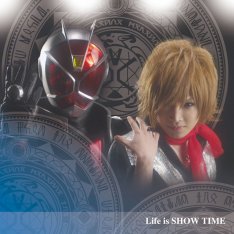
The discography of Japanese-American R&B and pop singer Hikaru Utada consists of eleven studio albums, three compilation albums, eleven video albums and numerous singles and promotional singles. Utada began as a musician in the early 1990s as a member of U3, a family unit made up of her, her mother Junko Utada, also known as 1970s enka singer Keiko Fuji, and her father, musical producer Teruzane Utada. U3 released their debut album Star in 1993, with the hope to debut in America. In 1996, the group was rebranded as Cubic U, an R&B project focusing on Hikaru Utada, resulting in the English language album Precious in 1998 with record label Toshiba EMI.

"Catch the Rainbow" is the twenty-first single by Japanese recording artist Misia.

"Boku wa Kimi ni Koi o Suru" is Ken Hirai's thirty-second single, released on October 21, 2009, just a month after "Candy". The single was released in two formats: limited CD+DVD and regular CD only editions. The title song was written for the movie Boku no Hatsukoi o Kimi ni Sasagu, starring Mao Inoue and Masaki Okada.

"Love Power" is the Japanese debut single of Korean boy group The Boss, released on April 13, 2011 on their Japanese label Sony Music Entertainment.

"Love Bingo!" is the second Japanese single released by Korean boy group The Boss. It was released on June 15, 2011 on the Japanese label Sony Music Entertainment.

"Love Parade" is the third Japanese single released by Korean boy group The Boss, originally intended as the last of their "Love Series". It was released on September 21, 2011 on their Japanese label Sony Music Entertainment. The single's B-side, "Girlfriend", was featured as the ending theme of the show Guru Guru Ninety Nine, which features a lot of different Japanese artists and has been running for many years. It was the show's fixed theme song from July 2011 until September 2011.

"Jumping" is the fifth Japanese single released by Korean boy group The Boss. It was released on March 28, 2012 on their Japanese label Sony Music Entertainment.

"Honki Magic" is the sixth Japanese single released by Korean boy group The Boss. It was scheduled to be released on August 1, 2012, on their Japanese label Sony Music Entertainment. The single's B-side song "Ikenai 1・2・3" was already revealed to be featured in the upcoming movie Ai Ore!, which features member Karam.

"Call" / "I4U" s the 29th single by Japanese pop group AAA. It is included in the group's second best of album AAA Best. The song was written by Kenn Kato and Mitsuhiro Hidaka. The single was released in Japan on August 31, 2011, under Avex Trax in six editions: CD and DVD A and B editions, CD-only C and D editions, and two Mu-Mo editions. "Call" / "I4U" debuted at number five on the weekly Oricon singles chart. The single charted for nine weeks and went on to sell over 42,300 copies in Japan.

Gold is the first studio album by the Japanese singer Jasmine, released in two formats, standard and limited, on July 21, 2010, by Sony Music Associated. The limited edition includes a bonus DVD.

"Life Is Show Time" is the debut solo single of Golden Bomber vocalist Shō Kiryūin. It serves as the opening theme song to the 2012 Kamen Rider Series Kamen Rider Wizard. In recording the song, Kiryūin stated that he felt closer to being like his idol Gackt, who performed a previous Kamen Rider Series' theme song in 2009. The single had 4 editions released: a standard CD release, a standard DVD release containing the music video, and two additional limited edition DVD releases subtitled "Oni" and "Ikusa" which include edited versions of the music video.

"Kanashiki Amefuri / Adam to Eve no Dilemma" (悲しき雨降り/アダムとイブのジレンマ) is the 22nd major single by the Japanese female idol group Cute. It was released in Japan on July 10, 2013.

Euphoria is the fifth major-label Japanese studio album by South Korean pop-rock idol band CNBLUE. It was released on October 19, 2016, under Warner Music Japan. The date marks the five-year anniversary of the band's debut with its record label.

Smile is the eleventh studio album by Japanese singer and songwriter Mai Kuraki. The album was released on February 15, 2017, by Northern Music. It is the follow-up to her 2014 compilation album, Mai Kuraki Best 151A: Love & Hope. The album was released on three editions: standard edition, fan club edition, and limited edition, which is accompanied with a bonus disc. Smile

Sappy is the second Japanese extended play and the by South Korean girl group Red Velvet. It was released by Avex Trax on May 29, 2019. The EP features six tracks, including their previously released singles "Sappy", "Sayonara", and the Japanese version of "Power Up".

5x20 All the Best!! 1999–2019 is the fifth greatest hits album by Japanese boy band Arashi. It was released through J Storm on June 26, 2019. The album debuted at the top spot of the Oricon Weekly Albums chart, selling 1,304,251 copies in its first week of release in Japan. It spent the most weeks at number one of any album on the Oricon Albums Chart in 2019, with four, and was both the best-selling album of 2019 in Japan, as well as worldwide, with 3.3 million copies sold, eventually becoming the world's best-selling album of the year for 2019.

Belie is a covers album by Japanese singer Akina Nakamori. It was released on 30 November 2016 under Universal Music Japan.

Folk Song 2: Utahime Aishouka is a covers album by Japanese singer Akina Nakamori. Although the original release was scheduled on 22 July, it was postponed by one week and released on 29 July 2009 under Universal Music Japan. It is Nakamori's seventh covers album.

Leo-Nine is the fifth studio album by Japanese singer LiSA. It was released on October 14, 2020, through Sacra Music and Sony Music Japan. Leo-Nine marks the singer's first full-length project in over three years since Little Devil Parade (2017). Like Little Devil Parade, Leo-Nine features a wide range of contribution from composers and producers, including long-time collaborators Pablo, Ryo Eguchi, Koichiro Takahashi, and Shota Horie. The album sold over 66,000 copies in its first week, reaching the number one spot on both Oricon Albums Chart and Billboard Japan's Hot Albums chart. Along with "Homura" debuting at number one on the Japan Hot 100, LiSA became the first artist ever to debut atop the Billboard Japan's charts simultaneously. The album has since received a gold certification from the Recording Industry Association of Japan (RIAJ).
"Cosmetic" is the eighteenth single by Japanese rock band SID, released on September 29, 2010, by Ki/oon Records. The song was included on the Dead Stock album and SID All Singles Best compilation.





















